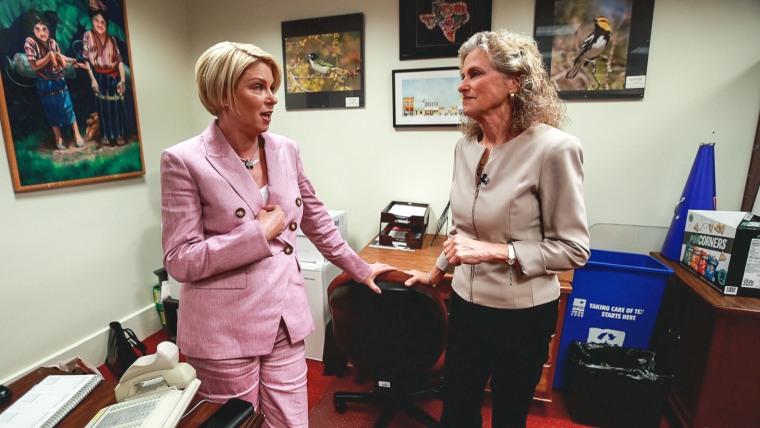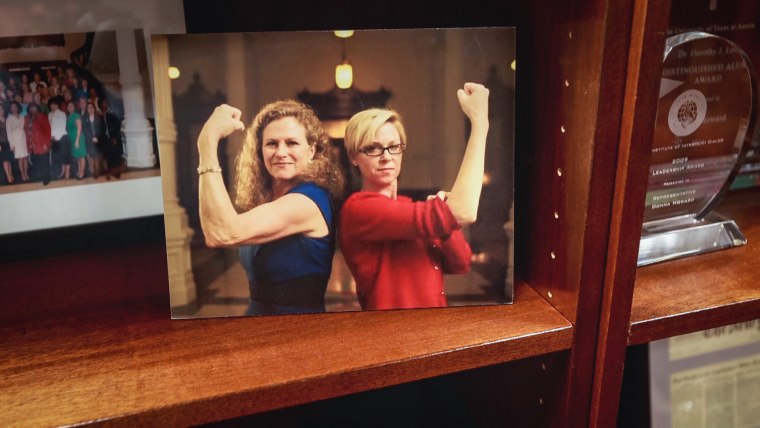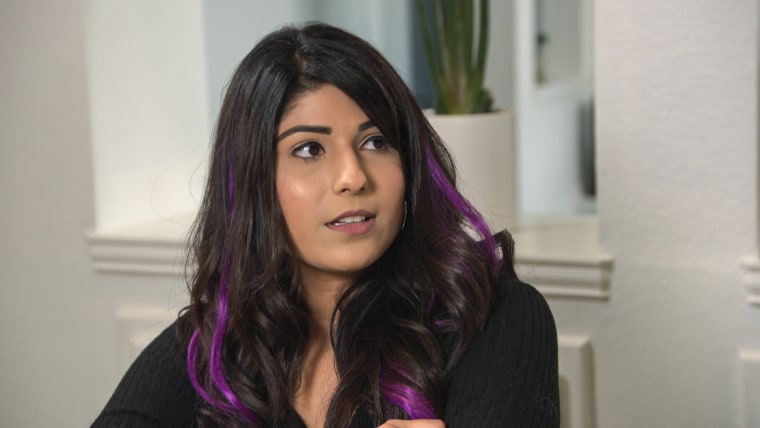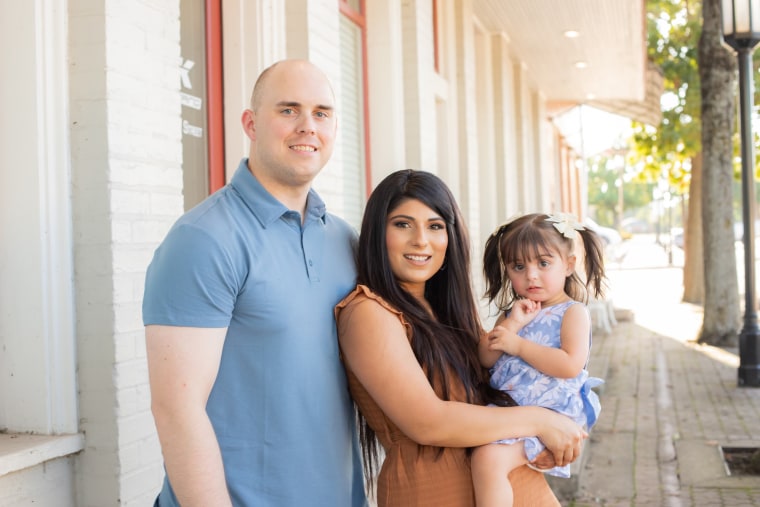Across the U.S., more than 2,500 crisis pregnancy centers (CPCs) provide free services and counseling for women struggling with unplanned pregnancies. They outnumber abortion clinics 3 to 1 nationwide, and as some states shutter clinics after Roe’s reversal, that ratio will grow.
But when two NBC News producers visited state-funded CPCs in Texas to ask for counseling, counselors told them that abortions caused mental illness and implied abortions could also cause cancer and infertility.
The nation’s largest national obstetricians’ group, the American College of Obstetricians and Gynecologists, says that’s medical misinformation.
The centers, which are often faith-based, frequently get funding from religious groups and individual donors, but many also depend partly on taxpayer dollars. CPCs have long been accused of providing what experts have called “misleading or false” information to discourage women from getting abortions, as NBC News witnessed firsthand after sending two producers to CPCs in Texas to request pregnancy counseling.
The producers did not tell the CPCs they were with NBC News.
At a CPC near the Mexican border visited by NBC News producers, a female staffer implied that abortions can cause cancer and infertility and played a video saying that abortions cause mental illness.
At another CPC in the Dallas area, a volunteer disclosed that the center does not offer abortions and then repeated the falsehood that abortions can cause infertility. Asked about the abortion pill, the volunteer told a producer, “My job is not to scare you … you never get over seeing that baby.” She then pointed to a plastic model of a fetus and said, “Can you imagine one of these in your panties?”
She added, “Because of government stuff … I can pray for you. I can’t pray with you” and sent the producer home with a pair of knit baby booties.
In Texas, prior to the Supreme Court’s Roe v. Wade reversal, CPCs outnumbered abortion clinics 9 to 1.
Established by the Texas Legislature in 2005, a program called “Alternatives to Abortion” or A2A helps fund the state’s CPCs. Texas initially spent $5 million every two years on the program, but that figure has ballooned to a record $100 million for 2022 and 2023, according to public records.
A2A’s mission is to “reduce abortions and improve pregnancy outcomes,” “improve child health and development” and “improve families’ economic self-sufficiency.” In addition to CPCs, the program funds resources like maternity homes for homeless pregnant women and adoption centers. The Texas facilities are not licensed medical providers, though some women report believing they are.

Texas state Rep. Donna Howard, a Democrat from Austin, said the program is a “waste of taxpayer dollars” and that there are not even any “metrics that indicate it has anything to do with averting abortions.” Howard, a critical care nurse and the former president of the Texas Nurses Association, said the misinformation that Texas CPC counselors gave NBC News producers was “offensive” and “shaming.”
Sarah Davis, a former GOP Texas state representative from Houston, said that “not only is that a horrible thing for a woman to be told and medically, totally inaccurate, but I don’t understand why conservatives who are always touting the party of fiscal responsibility … turn a blind eye to this.” For a decade, Davis and Howard partnered in the state House to demand accountability for A2A.
In Texas, a law enacted late last year made it illegal to get an abortion after six weeks of pregnancy, before many women even know they’re pregnant. With Roe v. Wade now overturned, Texas has a trigger law banning virtually all abortions, which will go into effect soon.
Texas women seeking abortions will now have to go out of state — but prior to Roe’s reversal, they already were. A study conducted by researchers at the University of Texas at Austin concluded that women who were looking to have an abortion generally went through with that decision regardless of the barriers imposed by the state’s restrictive abortion laws. By the end of last year, an average of nearly 1,400 Texans were traveling out of state every month to have abortions, according to the study. One in 4 of the women interviewed for the study had visited a CPC before getting an out-of-state abortion, which the study said “delayed their progress toward care.”
Despite the reversal of Roe, in Texas and throughout the U.S., CPCs will still be offering pregnancy counseling. According to a calculation by The Associated Press, at least 13 states have spent nearly half a billion dollars over the past dozen years to fund crisis pregnancy centers.
“They’re not going anywhere,” said Davis. “And so they have to be regulated because I don’t know what they’re doing and if you’re going to take my money, my taxpayer dollars, I want to know how you’re spending it.”
‘A mystery’
In 2011, the Texas Legislature cut the family planning budget by two-thirds. As a result, about a quarter of the state’s family planning clinics ultimately closed, leaving many low-income and uninsured women across the state without access to birth control, cancer screenings and wellness exams.
Davis said it was an effort to rid Texas of abortion and kick Planned Parenthood out of the state, and that to achieve that the state walked away from millions of federal dollars for family planning that had nothing to do with abortion. That same year, the Legislature steered more money into the A2A budget.

Since then, the state has steadily increased funding for other women’s health programs. Yet Texas still has among the worst maternal mortality rates in the country, especially among African American mothers. One in 4 Texas women of childbearing age are uninsured, the most in the country. And the state has the highest rate of repeat teen pregnancies.
A review of dozens of state-funded Texas CPC websites reveals the nonprofits offer similar services — pregnancy tests, ultrasounds, sexually transmitted infections' testing and parenting education — all free of charge. Most facilities say they offer “abortion information,” a degree of ambiguity that experts say can confuse pregnant women seeking unbiased information about their options. Despite advertising “accurate” and “evidence-based” information about abortion procedures, many websites have disclosures in tiny print at the bottom revealing they do not offer or refer for pregnancy terminations or even birth control.
The state reimburses the Texas centers for counseling, making referrals for government assistance programs and for providing goods like diapers and car seats, but not for medical services, such as ultrasounds and pregnancy tests.
It’s not just state dollars that fund these centers. From 2006 to 2021, Texas has funneled $45 million of federal funds from the Temporary Assistance to Needy Families program (TANF) into the A2A program, according to public records. No TANF dollars are going to the program this year.
A legislative report shows that last year Texas’ A2A program served 126,533 unique clients and provided them with 2,698,003 services, meaning each client received an average of about 21 services.
Howard and Davis question what those 21 services are, and say they remain “a mystery.” Howard noted that handing out pamphlets and making calls count as services.
But the Charlotte Lozier Institute, the anti-abortion rights research arm of Susan B. Anthony Pro-Life America, strongly disagreed, telling NBC News these centers provide “accurate information on adoption, parenting education classes, and prenatal health services.” Lozier does not fund or manage CPCs, but has previously spoken out in defense of them.
Howard and Davis also said that, in some instances, they believe the centers are committing “fraud.” They cited the misinformation given at some facilities, along with a case in which the state suspended funding after the president of a pregnancy center allegedly used money from A2A to pay for a smoke shop, limo rides, and to buy land for hemp production.
The Charlotte Lozier Institute said, “Apparently those lawmakers never spoke with any of the thousands of Texas women who have been supported by local pro-life pregnancy centers,” pointing out that the average client satisfaction rate of a center is “above 95%.”
Regarding misinformation, the Charlotte Lozier Institute did not directly deny that some centers give women inaccurate information about abortion and its risks. Instead, the institute told NBC News, “The claim of ‘misinformation’ has been used by various state and local governments as a reason to impose restrictions on pro-life pregnancy centers,” adding, “The real-world results don’t support the abortion industry’s narrative.”
Neither Texas Gov. Greg Abbott or Lt. Gov. Dan Patrick responded to requests for comment.
‘A weird feeling’
Almost a decade ago, Maleeha Aziz, who was 20 and had recently moved to Texas to attend college, learned she was pregnant. Low on funds, she booked an appointment at a facility touting free ultrasounds. She didn’t know it was a CPC, or even what a CPC was.
“I had a weird feeling when I walked in,” she said, noticing biblical imagery.

She said two women dressed in white lab coats told her she was about nine weeks pregnant, and that if she got an abortion, she would get breast cancer, become infertile and suffer from severe mental health problems.
Aziz got an abortion. Now married, she has a 2-year-old, a daughter she says she planned for and loves very much.
“My abortion has never caused me any mental health issues, any guilt,” Aziz said, “It has helped me improve my life and take control and choose motherhood on my terms.”
Aziz is now a reproductive justice advocate, working with the Texas Equal Access (TEA) Fund, which helps low-income individuals pay for abortions. She believes that desperate people will always find a way to access abortions and that the only thing that’s going to be eliminated is safe and legal abortions, particularly for low-income people of color. She said that even where abortions are still legal, if a woman googles “abortion near me,” she will often be directed to a CPC, not an abortion clinic.

TEA Fund clients will now have to go out of state for abortions, though TEA Fund is waiting to determine what its role should be post-Roe. For now it has suspended its helpline and its funding.
Aziz said one client recently made an appointment at a New Mexico clinic, thinking she could get an abortion there. When she arrived, however, she found out it was actually a crisis pregnancy center.
“If they [the CPCs] were doing something good,” said Aziz, “if they were providing a service that people needed, why would they feel the need to lie and manipulate people with false facts?”


